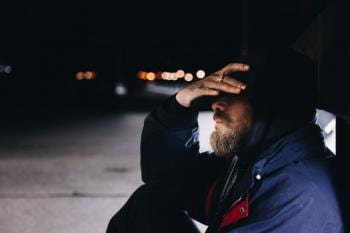
Men are taught not to be overly emotional. It’s as much in pop culture as it is in community. We are conditioned with words like “tough” and “strong” and “brave.” There is a sense that you should be able to handle anything and everything that comes your way.
There’s also a sense that it’s not always okay to be honest, and it definitely isn’t okay to talk about how you feel. Feelings and emotions and vulnerability and words like them feel heavy and gross to most guys. We don’t want to touch them.
This isn’t really a conversation about “mental health issues” or “depression”. It’s just a conversation about pain. How we relate to it. How we react to it.
Yet, they exist. And some of those feelings and some of those emotions absolutely need to be talked about. They deserve to be talked about.
But we don’t talk about them. We hide them. I think it’s because we feel a sense of shame around them. We feel ashamed that we hurt. We feel ashamed that we have questions. We feel ashamed that we aren’t perfect or maybe we’re feeling depressed. We think we should be tougher or stronger or immune from hurting.
And so when we do hurt, we decide to hide instead of ask for help. We isolate ourselves. We close our lips and close our lives and don’t let people in. We lie about how we’re feeling, and we hold back from talking to a friend or seeing a counselor because we believe that it might make us weak, inferior to the next guy.
A lot of this stuff comes down to opting out of honesty, help and healing in favor of staying comfortable. We’re so afraid of a moment being awkward, weird or too vulnerable that we run away from conversations and people we need.
Male culture is tricky that way. We’re told to be strong, and we’re taught that most of our strength is derived from never showing weakness.
And I think that’s an impossibly unhealthy way to live your life.
Guys have a hard time talking about topics like mental health and suicide. But because we don’t talk about it right now, we’re losing way too many lives to suicide. In fact, according to Heartlandmedical.com more than half of suicides worldwide are adult men between age 25 and 45. That’s more than half a million men every single year who are taking their own lives.
Words like “depression” and “addiction” and “self-injury” have become labels for issues that are difficult to put a proper dialogue around.
So I think there’s too much at stake not to have a conversation because it might be awkward or uncomfortable. Because I think life is worthy of a conversation. I think hope is worthy of a conversation. I think finding help is worthy of a conversation.
And I think staying alive is something we all should be passionate about. As a writer, I spend a lot of time (most frustrated) tinkering with words. Although words have the opportunity to show love and show humanity and help heal, they can also be dangerous. And I think words can become especially dangerous when they’re acting as labels. On some level, words like “depression” and “addiction” and “self-injury” have become labels for issues and problems that are difficult to put the proper language or dialogue around.
But when we can look past those labels, and those things that keep us on the outside looking in, we see that this isn’t really a conversation about “mental health issues” or “depression”. It’s just a conversation about pain. How we relate to our pain. How we react to our pain. How we choose to cope and how we are able to deal with our questions and our struggles.
I think shame is something we learn. We’re taught when to feel it, then we keep giving our consent to it over and over and over again based upon what we were once taught. I think shame is something that we should stop giving our consent to when it comes to these topics.
I don’t think mental health in men is something anyone needs to feel weird about. I think it’s okay to be honest. I think it’s okay to ask questions. It’s quite important that we do.
Because when we can take away taboos and we take a look at the truth, we see that suicide and mental health is a prevalent problem and we need to be okay with talking about that.
And truthfully, I think that there might not be anything more tragic than someone deciding that their life isn’t worth living.
Because their life is worth living. Their story is worth living.
Your story is worth living.
So if you’re reading this today and you know someone dealing with these issues—or maybe you’re dealing with these things yourself—start with being honest. Start with being brave enough to ask for help. Start with freeing yourself of shame and secrets and silence.
Because shame isn’t just unhealthy and stifling. It also kills. Shame and secrecy and silence and stigma all play a huge part in suicide.
The good news is, we each have the power to help change that. We can each speak out and shatter the silence, we can each play a part that could help in saving someone’s life. In a world obsessed with catchy pop songs, bad movies and which celebrity is going to twerk next, I think these things are worth talking about.
I think they are worth mentioning.
I think they matter.
And I think if there is anyone who needs to be talking about these things the most right now, it’s us guys.
Hopefully, this can be a step in that direction.


